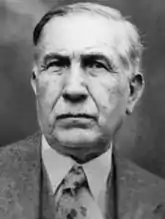Turkish History Thesis
The Turkish History Thesis (Türk Tarih Tezi) is a pseudohistorical study which posited that the Turks migrated in several waves from Central Asia to China, India, the Balkans, the Middle East, northern Africa populating and bringing civilization to the areas they have moved to. The theory developed within the context of pre-Nazi scientific racism, placing Turks as one of the "Alpine subgroup" of the Caucasian race.[2] The intent of the theory was a rejection of Western European assertions that Turks belonged to the "yellow or mongol" race. Mustafa Kemal Atatürk took a personal interest in the subject after he was shown a French language book that claimed Turks "belonged to the yellow race" and were a "secondaire" people.[3] The thesis was connected to contemporaneous persecutions of Alevis in Dersim.[4]

In the aftermath of World War I, Turks strove to prove to Western nations that they were equals and at this time this carried not only historical connotations, but racial ones. The Turkish History Thesis created a third alternative to the existing narratives that Greece and/or Mesopotamia were the "cradle" of Western civilization, but the thesis itself rested on a spurious intellectual foundation by claiming Hittite ancestry through a convoluted logic that rested on a theory of Central Asian Aryan origin that was being promoted by some European writers of the era. The thesis insisted on a common racial origin for all Turkish people who had created a great civilization in their Central Asian homeland in prehistoric times and have since preserved the same language and racial characteristics. According to the thesis, Turks had originally migrated from Central Asia to China and then India, founding the civilizations of Mohenjo-daro and Harappa, continuing to diverse parts of the world.[5]
The thesis pushed a view that Turks were racially what was called "brachycephalic", and thus racially similar to other Central Europeans. The internal contradictions of the Turkish History Thesis became more pronounced in later decades as Colonel Kurtcebe sought to raise modern Turks awareness of their connection to Central Asia and the Mongols. He believed that an emphasis on Western-style historical education had caused Turks to be uninterested in Mongolian history. This produced a confused doctrine where military publications had to maintain the Turkish History Thesis' connection with European races, but at the same time promote an image of a military superior to Western powers with roots in a mythic Central Asian past.[6]
The thesis was based on the book Türk Tarihinin Ana Hatları (The Mainlines of Turkish History), published by the Committee for the Study of the Turkish History 1930, becoming a "state dogma",[7] and later included in school textbooks.[8][9] The Thesis was made known to the public during the First Turkish Historical Congress between 2 - 11 July 1932.[10] During Atatürk's government, scholars like Hasan Reşit Tankut and Rıfat Osman Bey were encouraged that the findings of their studies in history and social sciences be in line with the Turkish Historical Thesis and the Sun Language Theory.[11] The Turkish Historical Thesis is connected with the Sun Language Theory published in 1935 which stipulates that all languages have their origin from the Turkish language.[12] Prominent scholars like Zeki Velidi Togan and Nihal Atsız, who challenged the Turkish Historical Thesis lost their work at the University.[13]
References
- Alexis Heraclides; Gizem Alioğlu Çakmak (2019). Greece and Turkey in Conflict and Cooperation From Europeanization to De-Europeanization. Routledge. ISBN 978-1-138-30188-7.
- Gürpinar, Doğan (2013-10-17). Ottoman/Turkish Visions of the Nation, 1860-1950. Palgrave MacMillan. p. 83. ISBN 9781137334213.
- Cagaptay, Soner (2006-05-02). Islam, Secularism and Nationalism in Modern Turkey: Who is a Turk?. Routledge. p. 54. ISBN 9781134174485.
- Kieser, Hans-Lukas (2 October 2019). "Narrating Talaat, Unlocking Turkey's Foundation: Talaat Pasha Father of Modern Turkey, Architect of Genocide, by Hans-Lukas Kieser, Princeton, Princeton University Press, 2018, 552 pp., USD$39.95 (hardcover), ISBN 9780691157627". Journal of Genocide Research. 21 (4): 562–570. doi:10.1080/14623528.2019.1613835.
Atatürk feverishly attempted but failed to evacuate Islam from Gökalp’s explosive mixture. To this fact, his Turkish History Thesis of the 1930s is a tragicomic testament, the political logic of which cannot be detached from the synchronous exterminatory campaign against Dersim’s Alevi Kurds. On provincial ground, this campaign went hand in hand with anti-Alevi Sunni stereotypes. Atatürk’s historical efforts toward the end of his life were pathetic. He tried in vain to retain Gökalp’s exalted Turkism alone, wanting to put republican nationalism on a scientific fundament of racial anthropology, ethnohistory, and linguistics.
- O'Donnabhain, Barra (2014-06-10). Archaeological Human Remains: Global Perspectives. Springer. p. 203. ISBN 9783319063706.
- Sencer, Emre (2016-11-25). Order and Insecurity in Germany and Turkey: Military Cultures of the 1930s. Routledge. p. 29. ISBN 9781315443270.
- Döşemeci, Mehmet (2013-12-23). Debating Turkish Modernity: Civilization, Nationalism, and the EEC. Cambridge University Press. p. 64. ISBN 9781107044913.
- White, Jenny (2014). Muslim Nationalism and the New Turks: Updated Edition. Princeton University Press. p. 26. ISBN 978-0691161921.
- Koruroğlu, Ayten; Baskan, Gülsün Atanur (2013). "An Overview and History Education in Republic of Turkey and Turkish Republic of Northern Cyprus". Procedia - Social and Behavioral Sciences. 89: 786–791. doi:10.1016/j.sbspro.2013.08.933.
- Uzer, Umut (2016). An Intellectual History of Turkish Nationalism. The University of Utah Press. p. 102. ISBN 9781607814658.
- Uzer, Umut (2016). An Intellectual History of Turkish Nationalism. The University of Utah Press. p. 94. ISBN 9781607814658.
- Jacob, David (2017). Minderheitenrecht in der Türkei. Mohr Siebeck2017. p. 151. ISBN 978-3-16-154133-9.
- Uzer, Umut (2016). An Intellectual History of Turkish Nationalism. The University of Utah Press. p. 127. ISBN 9781607814658.